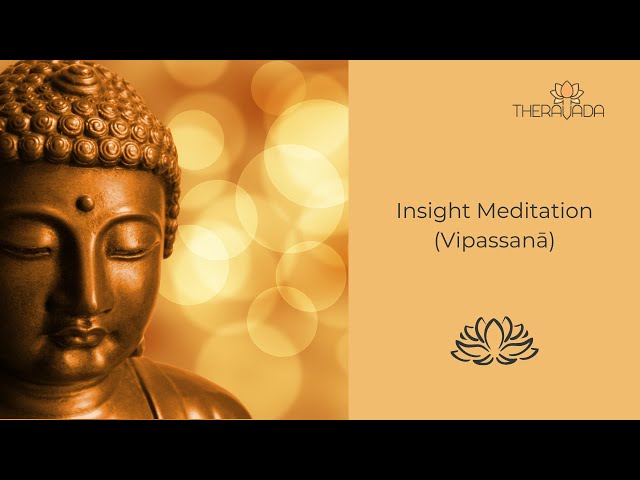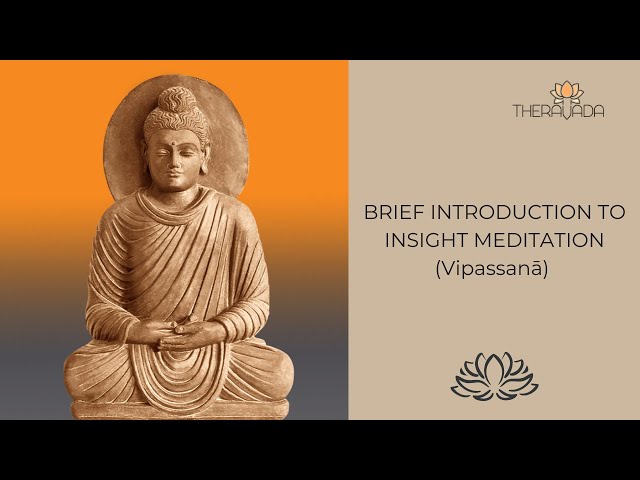Vipassanā Meditation
Insight Meditation was first taught by the historical Buddha, Gotama, more than 2,500 years ago and is unique in its kind. In fact, it was through insight meditation that he himself achieved Enlightenment and became a Buddha.
The word used by the Buddha for this meditation is vipassanā, which means specialized, expanded (vi) + vision, seeing (passana). In English it is translated as “insight”, which in a way means “one’s ability to be aware of things that are not perceived in the usual ways”.
And indeed, insight (vipassanā) does not use the usual ways of meditation but the systematic and methodical observation (anupassanā) of material and mental phenomena aiming at perceiving their actual nature.
It includes practice in mindfulness and awareness (sati-sampajañña) that are used to observe and understand the impermanent, unstable, transient nature of all material and mental phenomena, the attachment to which creates our suffering, stress and any other tribulations.
Essentially, the fundamental principle of insight meditation is the observation of rise (samudaya) and fall (vaya) of the physical body, the feelings, the thoughts, and the mental objects that construct our whole being.
Rise and fall is characteristic of a phenomenon that is impermanent, temporary, short-lived, ephemeral, temporary, momentary, fleeting, transient, unstable and not permanent. And this characteristic can be verified and ascertained through insight meditation, since it prevails and is omnipresent in all the phenomena of mind and matter. This knowledge leads to the insight of the three universal characteristics of our existence:
- impermanence (anicca),
- suffering, misery or pain (dukkha), and
- non-self (anatta).
The detailed explanation about insight meditation is found in the Buddha’s Discourse called “The Discourse on the Application of Mindfulness” (Satipaṭṭhāna Sutta). It is the most widely studied and practiced Discourse of the Buddha, which is rightly called “the Heart of Buddhist Meditation”. It is, as the Buddha calls it, “the direct path to the realisation of Nibbāna/Nirvāna”. It lays down a complete system aimed to train the mind to see with tiny precision the real nature of the body, the feelings, the thoughts and the mental objects, and to overcome the attachment to them.
The Buddha begins this Discourse with the statement:
“This is the direct path…
- for the purification of beings,
- for the surmounting of sorrow and lamentation,
- for the disappearance of pain and grief,
- for the attainment of the true way,
- for the realisation of Nibbāna.”
Therefore, the purpose of the meditation on the application of mindfulness is the purification (visuddhi) of beings. Here “purification” means purification from mental defilements, passions, illusions and attachment to impermanent phenomena that are the basis for suffering, misery or pain (dukkha). Thus insight meditation, through the application of mindfulness, is the path of purification, of cleansing of the mind (citta-vodāna).
As the Buddha said: “For a long time this mind has been defiled by passion, hatred, and delusion. Through the defilements of the mind beings are defiled, and with the cleansing of the mind beings are purified (visujjhanti)”.
(SN iii, Dutiyagaddulabaddhasuttaṃ)
Insight meditation exists in its original form in Theravāda Buddhism that retained the authentic teachings of the Buddha in the Pāli Canon, which is the first complete writing of the authentic Buddhist Teachings.
Today, it is mainly forest monks that possess this knowledge, who have studied in depth these ancient texts in their original language and have practiced these teachings through systematic meditation.
Bhante Nyanadassana, as a forest monk, has taught the Satipaṭṭhāna Sutta to many students in Asia and now teaches it in English and Greek in our country.



